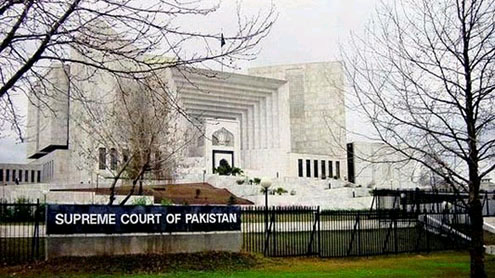
ISLAMABAD: The cross-cutting jurisdiction vested in the judiciary empowers it to oversee and ensure that no institution, department or authority may meddle in the domain of the other, Chief Justice of Pakistan Iftikhar Muhammad Chaudhry said Thursday, asserting that every state organ has to perform its duties and functions within its constitutional ambit.
“It is enjoined upon the judiciary that it exercise its powers in an independent and effective manner, and without any fear or favour,” Justice Chaudhry averred in his address to a hurriedly-called full court session on the Supreme Court premises. Admitting that not one institution had the capacity to provide good governance single-handedly, the chief judge remarked that because of its credibility and institutional mandate, the judiciary could inspire other institutions to do their duties in a transparent manner, keeping in view the interests of the people of Pakistan.
According to senior lawyers, the full court meeting was convened against the backdrop of the cold war going on between the judiciary and the army. In his address, Justice Chaudhry noted that the present day judiciary was being looked upon as an institution that had been delivering to the people in an active manner. “It is incumbent upon the judiciary to come up to the people’s expectations and become a role model for other state organs,” he said, and reiterated that the judiciary reserved the right to check unlawful, unauthorised or mala fide acts or exercise of authority by any institution.
The judge further said, “Institutions strive to excel and perform better, which is a welcome sign, as it is for better delivery and service to the people.” Justice Chaudhry, however, affirmed that the apex court was a constitutional body that had constitutionally guaranteed jurisdictions, such as the appellate, review, original and advisory. He also observed that the power of the Supreme Court, known as the power of judicial review, was a sacred trust. About capacity-enhancing of the judiciary, Justice Chaudhry said that efforts had been made to fill numerous posts lying vacant in the courts.
In this respect, he added, the prime minister had been approached through his principal secretary, with a request seeking issuance of directions to all those concerned for the allocation of required funds for recruiting additional judicial officers to meet the increasing workload and deficient infrastructure across the country. Showing satisfaction on performance of the courts, the chief justice maintained that the people’s faith in the judiciary had been restored and they were consulting with the courts more than ever before.
The meeting meanwhile noted that against the institutional figure of 13,653, the apex court disposed of 12,377 cases between January 01 and November 10, 2012. Almost as many cases were decided as were field during this period. The meeting noted that this success was due to the untiring efforts of judges who worked hard and worked back even during the summer vacation. About the cases pending, it was learnt that the apex court had resolved to formulate appropriate strategies for their early disposal. It was resolved that three two-member benches – two in Lahore and one in Peshawar – will be constituted to clear the backlog for the period of three months.
Further, two- and three-member benches would be constituted at the principal seat in Islamabad.Also, the meeting decided to grant the status of (senior) Advocate Supreme Court (ASC) to Syed Sami Ahmad, Mushtaq Ali Tahir Kheli, Akhter Hussain and Yaseen Azad. The issue of enrolment of new AORs was also discussed. The names of Said Tahir (Swat), Saadullah Mian (Peshawar), Muhammad Ayaz Khan Swati (Quetta) Syed Rafaqat Hussain Shah (Rawalpindi), Qari Abdul Rasheed (Rawalpindi), Ahmad Nawaz Chaudhry (Jhelum) and Tariq Aziz (Islamabad) were approved for the enrolment as AORs.
For the other stations, the meeting decided that their enrolment cases might be deferred for the time being. The meeting was informed that Akhter Hussain, the Pakistan Bar Council vice-chairman, had requested that the 50th anniversary song, Justice for All, authored by Justice Tassaduq Hussain Jillani, which was first played at the inaugural function of the Supreme Court on August 14, 2006 in Islamabad, might be played by the PBC during its official functions.
The chief justice asked for the author-judge’s permission that was readily accorded by Justice Jillani, who conceded it as a great honour for him. After deliberations, the meeting decided that the said song might also be adopted as anthem by the Pakistani judiciary. Besides, the meeting accorded approval to the request by the Pakistan Bar Council to play the anthem at its functions. It also decided to convene an international judicial conference in the third week of April next year, as per the traditions set by the apex court.
It was decided that a committee, comprising four senior-most judges of the Supreme Court, would be authorised to take all necessary decisions for the successful holding of the said conference.The meeting was attended by Justice Tassaduq Hussain Jillani, Justice Nasirul Mulk, Justice Anwar Zaheer Jamali, Justice Khilji Arif Hussain, Justice Tariq Parvez, Justice Mian Saqib Nisar, Justice Asif Saeed Khan Khosa, Justice Sarmad Jalal Osmany, Justice Amir Hani Muslim, Justice Ejaz Afzal Khan, Justice Ijaz Ahmed Chaudhry, Justice Gulzar Ahmed and Justice Sheikh Azmat Saeed, Supreme Court Registrar Dr Faqir Hussain and Additional Registrar Sajid Mehmood Qazi. – Nation












